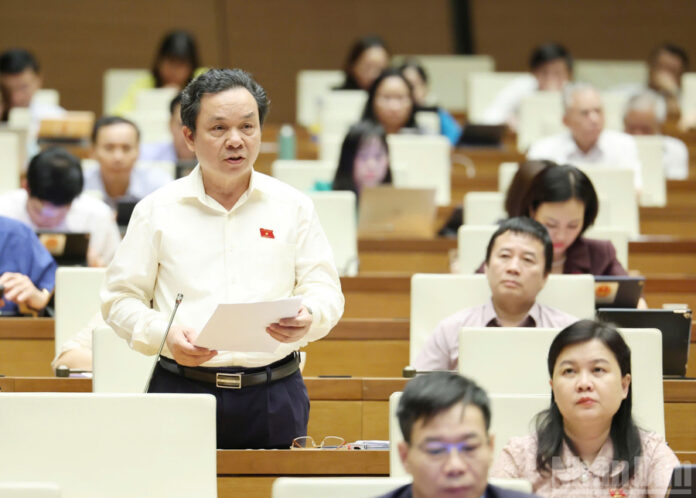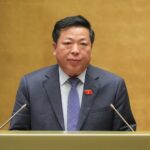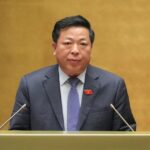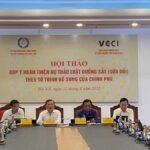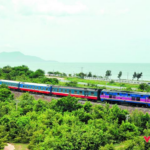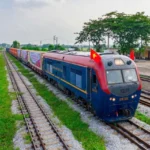On the afternoon of June 18, the National Assembly continued its 9th session with a discussion in the hall about the draft amended Railway Law. Delegate Hoang Van Cuong from Hanoi shared his opinion, evaluating the draft amended Railway Law as groundbreaking and potentially boosting the development of the railway industry.
ENSURE A SECURE MARKET FOR VIETNAMESE ENTERPRISES TO CONFIDENTLY PRODUCE GOODS
Specifically, Mr. Cuong agreed with the regulation that assigns the Prime Minister to issue a list of goods, services, and railway industry products that will be assigned or ordered from Vietnamese enterprises for production.
To ensure that Vietnamese enterprises can confidently produce goods, it is necessary to guarantee an outlet market, meaning that the domestic market must be reserved for them, with no importation of these products from foreign countries.
However, the draft Law also includes a regulation on import tax exemption for railway-serving goods that cannot be produced domestically.
The delegate stated that, in reality, Vietnam does not yet have a railway industry, so most railway-serving products cannot be produced within the country.
“If this regulation is enacted, it is very likely that the enterprises receiving orders will import products from abroad or even hire the production of components for assembly. This will defeat the goal of developing the railway industry,” said Delegate Hoang Van Cuong.
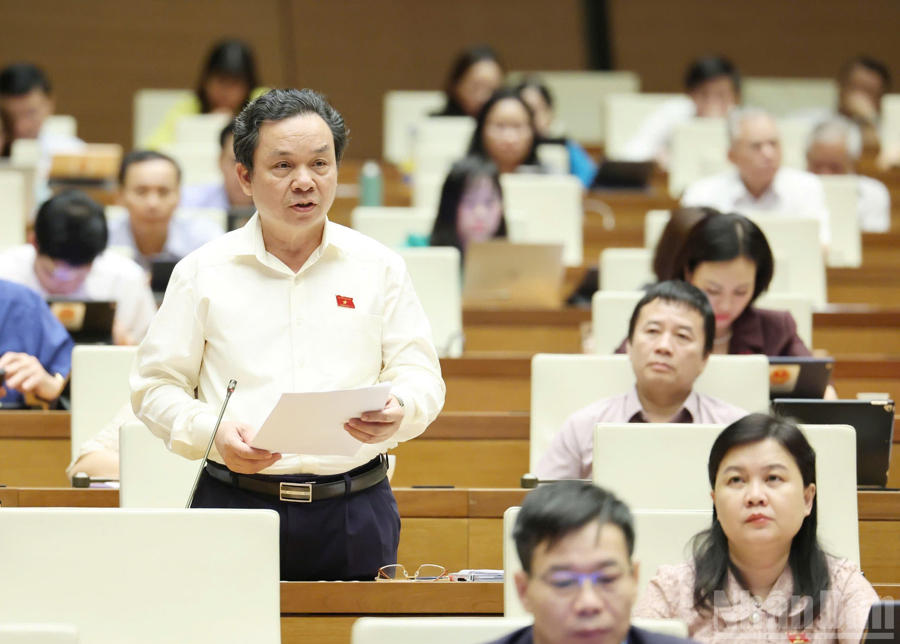
Therefore, the delegate suggested clearly stipulating that the importation of products, goods, services, and even components for assembly into products and services on the list that the State will assign or order from domestic enterprises for production should not be allowed.
Regarding the regulation encouraging organizations and individuals to participate in investing in railway projects with non-state capital, Mr. Cuong believed that this is a very correct policy.
However, the draft Law only stipulates the designation of investors for projects self-proposed by investors or for railway projects invested in through the form of public-private partnerships (PPP). For railway projects planned to be invested in with state capital, such as the North-South high-speed railway project, there is no mechanism for private investors to participate.
Therefore, the Hanoi delegate suggested the necessity to supplement the draft with a method for selecting private investors to participate in railway projects planned to be invested in with state budget funds, either in whole or in part. Alternatively, the Prime Minister could issue regulations on criteria for selecting private investors to participate in projects with three principles.
Specifically, these principles include maintaining the project’s goals and technical requirements, ensuring that capital investment costs with private participation do not exceed the State’s initial expectations, and achieving operational efficiency for the State that surpasses what would be achieved through sole state investment.
Emphasizing the necessity to comprehensively amend the Railway Law, Delegate Nguyen Minh Duc from Ho Chi Minh City pointed out that, for a long time, railways have accounted for a very small proportion of the transport structure and have lagged in development compared to other modes.

Therefore, it is urgent to perfect the legal corridor to mobilize social investment and synchronize the planning connection of economic regions. This also serves as a legal foundation for developing key national projects such as the North-South high-speed railway, urban railways, and the Hanoi-Lao Cai railway…
The delegate stated that the draft has basically and timely institutionalized a number of policies in the resolutions of the Party Central Committee and the National Assembly on private economic development. It has expanded the subjects and forms of investment to mobilize all resources of the private economy to participate in railway development. “As investment in railways is very large, involving the private sector in railway development has the advantage of being able to mobilize capital,” said the delegate.
However, there must be very strict regulations to ensure a cautious mechanism and policy, especially regarding issues related to national security and defense, to avoid cases where projects may be transferred or sold to other investors, including foreign investors, according to Mr. Duc.
Additionally, the delegate believed that it is essential to unify standards, quality, and the State’s tight control mechanism to prevent investors from choosing multiple different technologies, leading to a lack of uniformity and safety in the railway system.
CONCERNS ABOUT INVESTORS PROPOSING TO BUILD RAILWAYS BUT ACTUALLY FOCUSING ON TOD PROJECT DEVELOPMENT
Regarding the development of urban areas following the TOD model, Delegate Hoang Van Cuong agreed with the regulation assigning the People’s Committees of the provinces where the national railway lines pass through to organize the formulation, appraisal, and approval of adjustments to the planning of urban areas developed following the transit-oriented development (TOD) orientation.
At the same time, the provincial People’s Councils are authorized to use the budget to implement compensation, site clearance, and the creation of clean land funds around the TOD area for auction and revenue collection. Mr. Cuong believed that this would exploit the advantages of the railway project.
However, the draft Law also stipulates that, for national railway projects, the provincial People’s Committees where the railway lines pass through are authorized to designate investors to build railways and simultaneously implement urban TOD development projects.
“If this regulation is enacted, it means that regardless of which investor builds the railway, they will also be the investor in charge of the TOD urban development project. This could lead to a situation where investors propose to build railways but focus mainly on TOD project development,” he explained.
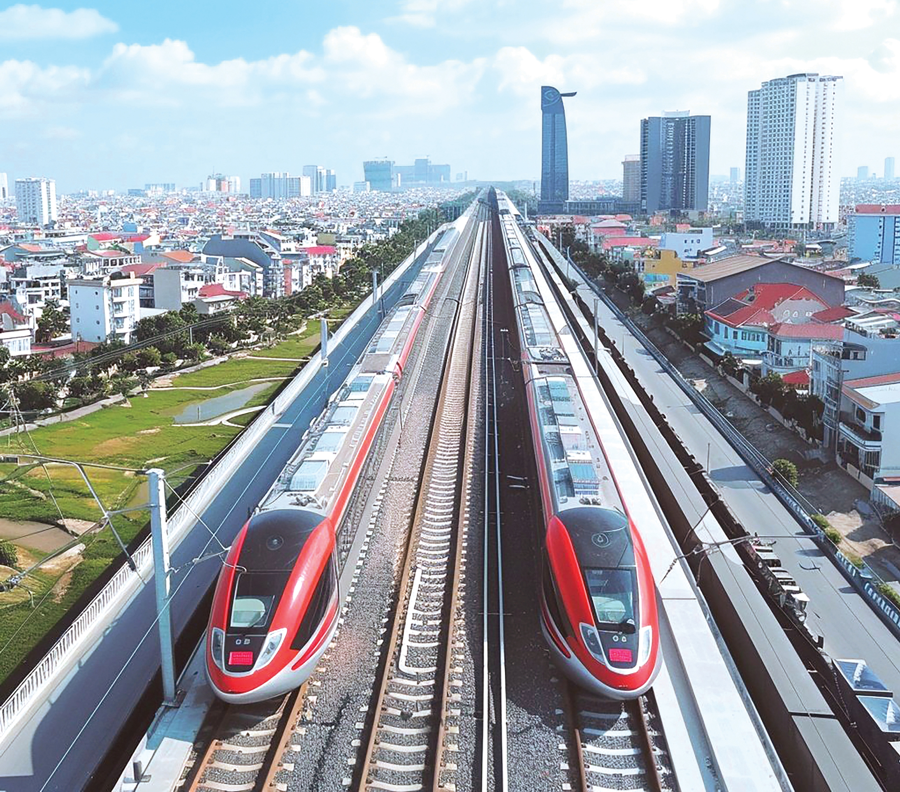
Based on this analysis, the delegate suggested regulating the TOD part next to the railway project to be invested in and managed by the State. Afterward, it can be put up for bidding or auction.
If there is a desire to prioritize investors who build railways to develop these urban projects, it is possible to add a regulation that investors implementing railway projects will be given priority in participating in the bidding or auctioning of TOD projects.
Regarding designated bidding, Delegate Hoang Van Cuong agreed with the Government’s explanation that there are urgent cases where designated bidding is necessary, as many items of railway construction works are unique and cannot be competitive. At the same time, all designated contracts must be made public to prevent corruption.
However, Article 32 does not reflect this spirit, and Clause 1 and Clause 4 of this article almost stipulate that most items of investment in railway projects will be designated without mentioning the publicity of designated bidding contracts.
On the topic of infrastructure management, the delegate believed that, except for dedicated railways, all other railway lines, whether invested in with state budget funds or private capital, form a system of public transport infrastructure. Therefore, they must be used for public purposes and managed according to regulations on state asset management.
The delegate gave an example: “If a private investor builds a railway from Noi Bai Airport to Hanoi and considers it as private property, operating it at the enterprise’s discretion could easily lead to traffic congestion and social harm. Therefore, Mr. Cuong suggested regulating that the infrastructure of railways invested in by enterprises is public transport infrastructure and must comply with state regulations on management, operation, exploitation, and maintenance.”
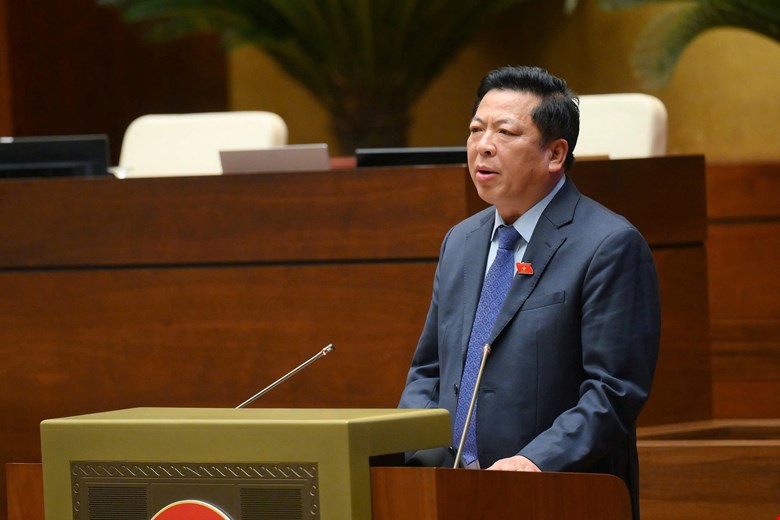
Clarifying these issues, Mr. Tran Hong Minh, Minister of Construction, shared that the TOD development policy will bring dual benefits. On the one hand, it contributes to urban planning and renovation, optimizing land use efficiency, and, on the other hand, it generates revenue for the state budget from land to reinvest in socio-economic development, including the railway system.
The TOD model also helps open up economic development along the railway lines, increasing development opportunities and ensuring a better life for people living near the railway areas.
Regarding the policy on railway industry development and technology transfer, the Minister assessed this as a highlight of the draft Law. It timely institutionalizes the directions of the Party, State, and Government leaders on industry development and technology transfer in the railway sector toward self-reliance, autonomy, and proactiveness.
Another issue of interest to the delegates was investing in railway projects with non-state budget capital. The Minister shared that this aims to institutionalize Resolution 68 of the Party Central Committee on private economic development. This regulation will open opportunities for the private sector and mobilize private resources for railway development, thereby reducing the pressure on the state budget in allocating capital for this field.
The draft Law has clearly defined the State’s management role in approving the framework of standards to control technology, maintaining the authority of the specialized construction agency in conducting appraisals, inspections, and quality acceptance of construction works.
Optimizing the Railway Act: A Comprehensive Review and Suggestions for Improvement
The railway industry has long been stagnant, failing to keep pace with the rapid development of other transport sectors. The proposed amendments to the Railway Law are of paramount importance and are expected to offer significant opportunities for Vietnamese businesses to get involved in infrastructure and vehicle development.
Revolutionizing Legal Frameworks: Forging Ahead with National Railway Systems
The proposed amendments to the Railway Law signify a pivotal moment for Vietnam’s railway industry. This draft law represents a bold initiative to establish a transformative legal framework, paving the way for the industry’s dynamic evolution and setting a precedent for transportation sector reform in the country.

